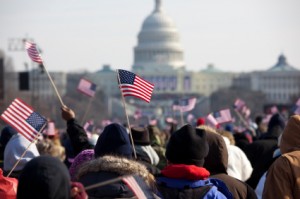This is part 6 of a 6-part article.
Click Here to Download a Printable Version of This Article
Read Part 1 Here
Read Part 2 Here
Read Part 3 Here
Read Part 4 Here
Read Part 5 Here
Solutions Old and New
The anti-Federalist solutions for these problems may well have helped. They proposed that the people amend the Constitution, specifically in the following ways:
- The Bill of Rights would include the requirement that juries consist of local peers who know the accused and can protect citizens from government.
- Treaties would require full debate in and passage by Congress—just like laws.
- Any decision by the Supreme Court could be overridden by a majority of the States.
How effective these amendments would have been is debatable.
But the answer may be found in another proposed anti-Federalist amendment which actually did get passed.
To counter the danger of huge expenditures and taxes by the Executive Branch, loss of power from the House to the Presidency, and transfer of powers from the States to the federal government, the anti-Federalists wanted an amendment clearly stating that all power not specifically given by the Constitution to the federal government would be retained by the states.
The anti-Federalists got their way in the ratification of the Tenth Amendment:
“The powers not delegated to the United States by the Constitution, nor prohibited to it by the states, are reserved to the states respectively, or to the people.”
Unfortunately, these were weakened by Court cases between 1803 and 1820, and later by treaties adopted between 1944 and 2001.
We the People
 It turns out that Constitutional limits and language are only guaranteed to last as long as the people are vigilantly involved.
It turns out that Constitutional limits and language are only guaranteed to last as long as the people are vigilantly involved.
No matter what the Constitution says, it won’t endure if the people don’t closely read it and demand that it be followed.
In this sense they are the fourth branch of government: The Overseers.
When the people stop requiring officials and experts to adhere to the Constitution, those in power alter the Constitution, redefine its precepts, and sometimes mutually agree upon a revisionist and opportunistic definition of its language.
The people are left out of the decision, and their freedoms decrease.
At times, as designed, constitutional checks and balances keep one branch from usurping power even if the people aren’t involved.
But the greater danger occurs when a collusion of branches agree in taking away power from the states or the people (this happens too often, especially since Butler v. the United States in 1936).
Arguably the most important document for freedom ever created by mankind was established and ratified by those who supported the U.S. Constitution.
The second deepest freedom analysis of government was provided by their opponents, the anti-Federalists.
This second group saw that whatever a Constitution says, as important as it certainly is, the people simply must stay actively involved or they will inevitably see their freedoms decline.
The Producer Perspective
The fact that both groups came from a society of owners and producers is neither surprising nor insignificant.
Owners value freedom over security, see the most decorated experts and celebrities as merely other citizens, and see their own role as citizen as vital to society.
Producers think in terms of protecting society’s freedoms, and they simply don’t believe this responsibility can ever be delegated or ignored.
Successful ownership, farming, and entrepreneurship are all about keeping track of all the details; taking action whenever it is needed to achieve the desired results; listening to the counsel of experts and authorities—and then leading by making the best decisions even if they goes against expert advice; and building effective teams that work together without depending too much on those at the top.
People trained and experienced in such skills are truly competent in handling and preserving freedom.
What we need in our day is not necessarily more specific proposals from the Federalists or anti-Federalists.
Rather, we need a return to the producer-entrepreneurial style of thinking and expertise that founded and built the freest nation in history.
If we want a society of freedom that lasts and prospers, we must as citizens become talented and practiced in the arts of freedom.
America was created on the basis of freedom, and until we choose to become a citizenry steeped in freedom principles and actively involved in their promotion, freedom will not likely increase.






Great article. This brought to my mind the analysis that Madison made in Federalist Nos. 50 and 51. He explored the merits of having an independent Council of Censors inquire whether the Constitution had been violated. He concluded that this approach would not be effective, and that we must rely on checks and balances and division of powers.
Of course, as you mentioned, the “danger occurs when a collusion of branches agree in taking away power from the states or the people.” I think we’re certainly at that point in our society.
Now, the only solution is to create a movement of people who will uphold the Constitution.
As look around at all the various groups claiming to promote liberty (do I need to name them?), I’m not really comfortable aligning myself with any one of them. But it seems that this site is promoting the right attitude and the right principles.